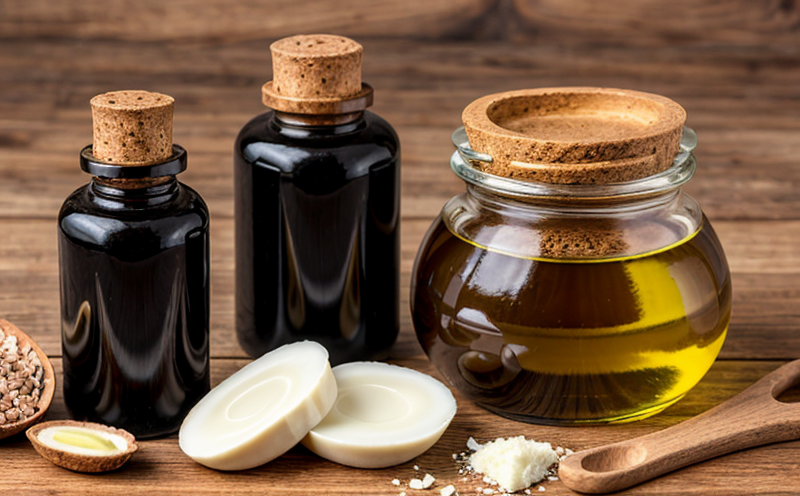EN 16850 Tocopherol Profiling in Edible Oils
The European Standard EN 16850:2013 provides a standardized method for the determination of tocopherols in edible oils. This standard is critical for ensuring that oils meet regulatory requirements and quality specifications, which are essential for maintaining consumer safety and product integrity.
Tocopherols are potent antioxidants present in natural fats and oils. They play a crucial role in preventing oxidative degradation during storage and processing. The EN 16850 method specifically targets the quantification of alpha-, beta-, gamma- and delta-tocopherols, which vary significantly among different types of edible oils.
The standard outlines a comprehensive procedure that involves several steps including sample preparation, extraction, derivatization (if necessary), chromatographic separation, detection, and quantitative analysis. This method is designed to ensure accurate and reproducible results across laboratories, making it an indispensable tool for quality control in the food industry.
Sample preparation typically involves mechanical homogenization of oil samples followed by a solvent-based extraction process. The choice of solvents can vary depending on the specific requirements of the analysis but often includes hexane or ethanol. Post-extraction, the sample may undergo derivatization using reagents such as 2,6-dichlorophenolindophenol (DCPIP) to enhance sensitivity and selectivity in the detection process.
Chromatographic separation is performed on a liquid chromatography system equipped with a suitable detector like fluorescence or UV/Vis. The standard specifies column dimensions and conditions that ensure optimal resolution of the tocopherols. The quantification step involves calibration curves prepared from authentic standards, ensuring accurate determination of the concentrations present in the sample.
The results obtained are presented in terms of milligrams per kilogram (mg/kg) for each individual tocopherol type. Compliance with this standard is essential for maintaining product quality and meeting regulatory requirements set by various national and international bodies such as the European Food Safety Authority (EFSA).
Regular monitoring through EN 16850 ensures that processed oils remain stable, safe, and of consistent quality throughout their shelf life. This not only protects consumer health but also enhances brand reputation and market confidence.
Industry Applications
- Palm Oil Industry: Monitoring tocopherol levels helps in optimizing processing conditions to maintain the desired antioxidant content, ensuring that processed palm oil remains stable during storage.
- Corn Oil Manufacturers: The standard is used to ensure consistent quality of corn oil by verifying the presence and concentration of tocopherols, which are essential for maintaining product integrity.
- Soybean Oil Producers: EN 16850 helps in assessing the antioxidant properties of soybean oil batches, ensuring that they meet both internal standards and external regulations.
- Vegetable Oil Exporters: Compliance with this standard is crucial for export markets where stringent quality controls are required to ensure product acceptance.
International Acceptance and Recognition
The EN 16850 method has gained widespread recognition across Europe and beyond, being adopted by numerous national standards organizations. It is particularly popular among food safety agencies responsible for ensuring the quality of edible oils.
The European Food Safety Authority (EFSA) recommends this standard as a means to ensure that processed oils are safe for consumption. Regulatory bodies in countries such as the United States and Canada also recognize the importance of this method, incorporating it into their own guidelines where appropriate.
International organizations like the Codex Alimentarius Commission have acknowledged the significance of EN 16850, endorsing its use globally to harmonize standards across different jurisdictions. This standardization is vital for facilitating international trade and ensuring that all parties involved are working towards common quality benchmarks.
Use Cases and Application Examples
Quality Control: Regular testing of tocopherol levels in edible oils helps manufacturers maintain consistent product quality. This is particularly important for large-scale producers who must ensure that each batch meets the required standards.
R&D: Research and development teams use EN 16850 to explore new methods of processing and storing oils, aiming to enhance their shelf life and overall stability. By understanding the tocopherol content in detail, researchers can identify optimal conditions for extraction and storage.
Compliance Audits: Compliance officers often rely on this standard during audits conducted by regulatory bodies. It provides a reliable basis for demonstrating adherence to quality standards and regulatory requirements.
Consumer Safety: Ensuring that tocopherol levels are within acceptable limits is crucial for maintaining consumer safety. This is particularly important in cases where oils may be consumed directly or used as ingredients in food products.





